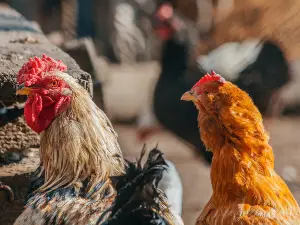
Raising birds isn’t easy, these animals all have their own personalities and keeping track of a flock can be a full-time job. Birds are social animals, they like doing things in groups. These feathered animals are usually seen roosting in large flocks and flying around together. Because of their social tendencies they share more than just the sky, they can share diseases as well. If one of your birds has sour crop you may fear that this can be passed on to other birds in the flock. But can it? Is sour crop contagious? This article looks into it
Sour crop is not contagious, sour crop is caused by a bird ingesting too much food too quickly or ingesting objects that cannot easily pass through its crop, these objects can include rubber bands, long stringy grass, small pieces of metal, plastic, feathers or even worms
Table of Contents
Is sour crop contagious?
Certain bird diseases are highly contagious, they don’t even need birds to touch in order to be transferred. Some diseases, namely Marek’s disease, can travel through the air and can be spread to birds five miles apart. Thankfully, sour crop is not like Mareks, sour crop is not contagious
Sour crop is incidental, not contagious, it happens as a result of the birds own doing. If a bird eats too much, the crop can fill with food too quickly, this causes the crop to enlarge, if the food does not pass through the crop a blockage can happen. Over time this trapped food ferments or breaks down, this causes an overgrowth of the candida which overtakes other bacteria in the crop. This is pretty much a yeast infection. The result is a foul smell coming from your bird’s mouth, this is why it is called sour crop
Another way that birds can develop sour crops is if the bird eats a lot of long grasses, straw or hay which don’t pass through the crop easily. Sour crop can also happen if the bird eats inorganic materials such as small pieces of metal, rubber bands, plastic, feathers and if the bird has worms.
Can sour crop go away on its own?
If the bird cannot pass the material that is in its crop naturally then no, the sour crop will likely not go away on its own. If you notice that your bird’s crop has been full and is not emptying as usual then you’ll have to intervene.
How do you get rid of sour crop?
If the bird’s crop is enlarged, but the animal does not have any other symptoms associated with sour crop, then you can leave the bird unfed and without water for 24 hours to allow the food to go down.
If the food hasn’t gone down in 24 hours then you may have to massage the bird’s neck to try to dislodge the food. Syringe olive oil diluted oregano oil into the side of the bird’s troat to lubricate the crop then gently massage upwards
Other remedies that you can try include feeding the bird apple cider vinegar diluted in water, dissolving Epsom salts in water and serving it to the bird, giving the bird tomato juice or giving the bird molasses diluted in water
If these at-home remedies do not get rid of your bird sour crop then you’d need to take your bird to a vet to be examined and treated.
Conclusion
In conclusion, no, sour crop is not contagious. This ailment is incidental and is caused by the bird eating too much food too quickly or eating materials that do not pass through the crop easily. There are a variety of home remedies that you can try to treat this issue but if these do not work it is important to take your bird to a vet for treatment
If you enjoyed this article then you may also be interested in other crop related articles. Here are some articles that you may be interested in: Do crows have a crop?, Treating an impacted crop with olive oil, does it work?, Sour crop in pigeons, how this happens, Sour crop treatment: apple cider vinegar, effective or harmful, Antibiotics for sour crop, are they needed?, Sour crop medication, safe and effective ways to cure your bird, Baking soda for sour crop, does it work?

